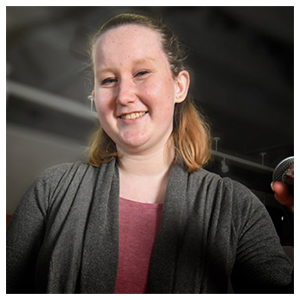Miriam’s Journey to Sound
 “It was one of the best days of my life,” says Miriam Green in an emotionally charged voice. “I wish everyone could experience how I felt that day. I found myself again.”
“It was one of the best days of my life,” says Miriam Green in an emotionally charged voice. “I wish everyone could experience how I felt that day. I found myself again.”
The journey to that life-changing day began when Green was in middle school. A routine screening at the school revealed a hearing deficit. “I don’t think I noticed before that day that I was experiencing it,” explains Green. “I think I had just really gotten good about figuring out ways to adjust. I would lip read—or if I didn’t understand something the teacher said in class, I would look up additional information in the textbook.”
Myringotomy tubes (“ear tubes”) were surgically placed inside both of Green’s eardrums to improve her hearing, but her loss continued to progress. In 2017 as a college sophomore, Green consulted with M. Mackenzie Hill, AuD, a board-certified audiologist with the UT Physicians Otorhinolaryngology clinic in the Texas Medical Center.
Dr. Hill discovered that Green had a permanent hearing loss and that it was negatively impacting her ability to effectively communicate in social and academic settings. “I ran a full range of diagnostic evaluations of the peripheral auditory pathways to access the loss,” says Dr. Hill. “The last thing she wanted was for her academic studies and success to be compromised by her change in hearing, which I greatly admire and respect. She was motivated from the very beginning to do whatever it took to improve her hearing.”
As a vocalist major, Green had concerns about exploring hearing aids. “I was worried about the sound quality,” says Green. “Dr. Hill was very patient and spoke with me about which type of hearing aid would best fit my needs.”
“When people think of hearing aids, they picture them like they were decades ago,” says Dr. Hill. “They are discreet, they aren’t constantly squeaking—and they are very close to natural sound. Untreated hearing loss is more noticeable than the hearing aids available today.”
Green explains how her hearing aid connects directly to her smart phone. “I can answer calls with the audio sent directly to my hearing aid through Bluetooth,” Green says. “I use to be scared of taking phone calls because I couldn’t hear the entire conversation—or see the person talking to help figure out what they were saying. Now I can hear them and even control the settings of my hearing aids via an app.”
“We don’t want people to feel nervous about coming in to get their hearing checked,” says Dr. Hill. “Knowledge is very helpful. Often times, people don’t think there is any harm in letting hearing loss go unchecked. However, auditory deprivation is serious. Lack of meaningful auditory information to the brain causes atrophy. It is the old—if you don’t use it, you lose it. By getting it addressed, you can stop the loss from progressing—or slow it down.”
Green says for the most part, people don’t even realize she is wearing them. She also encourages people with a hearing deficit to lean on a support system. “It is important to speak with others who are experiencing similar challenges,” said Green. “It has made my life better.”
While Green’s hearing loss is not due to a physical reason, but most likely how sound is transmitted to her brain, Dr. Hill reminds everyone to be careful about hearing conservation. “Over the years, industries have improved hearing protection, but now we are seeing increased hearing deficits in children,” says Dr. Hill. “One in five teenagers are showing signs of high frequency hearing loss. Playing music or watching videos with the sound too loud is an overload of their auditory system. Hearing loss can’t be repaired. Parents should always monitor their child’s devices and headphones.”
While middle school marked the discovery of Green’s hearing loss, it also awakened her love for opera. “My mom says I have been keeping time since before I was born,” says Green with a smile in her voice. “My seventh grade choir teacher took us to an opera. I fell in love with it.”
With crystal clear sound, Green, a soprano, is planning a career directing operas. “Everything is just clicking for me. The day my hearing aid was turned on—I cried,” says Green. “I cried and then I called my mom. I could actually hear someone without having to look at them to try and read their lips. My life has been changed.”
“Miriam’s Journey to Sound,” by Melissa McDonald (UTPhysicians Media Relations), first appeared as a news post on the UT Physicians website.
